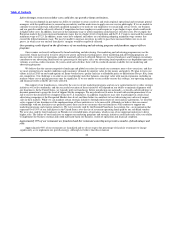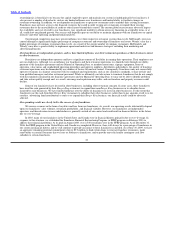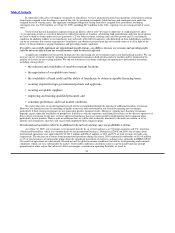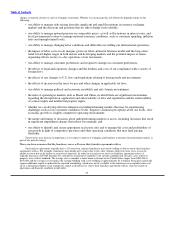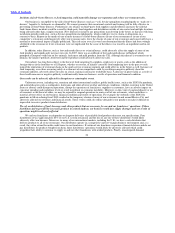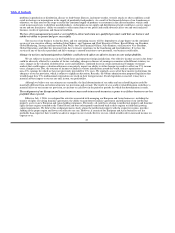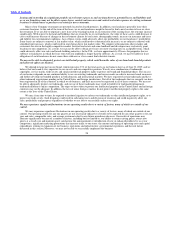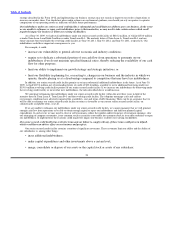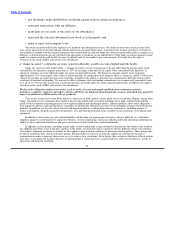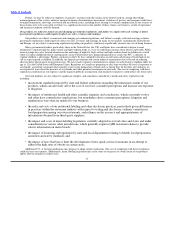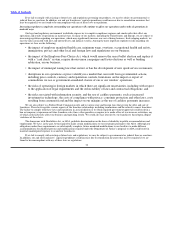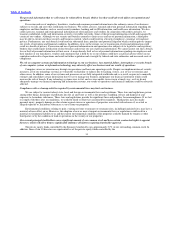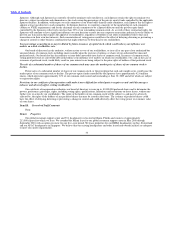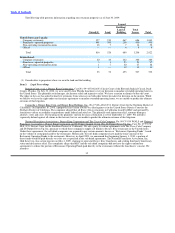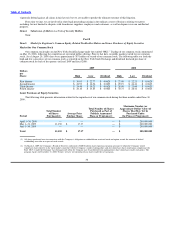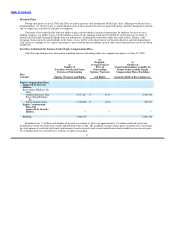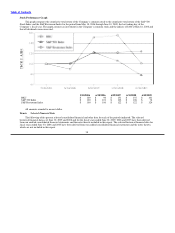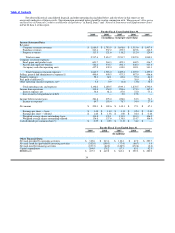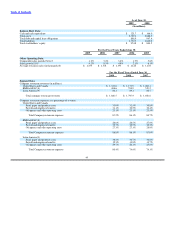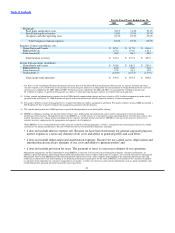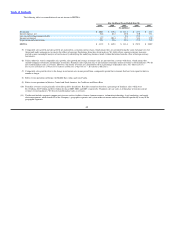Burger King 2009 Annual Report Download - page 34
Download and view the complete annual report
Please find page 34 of the 2009 Burger King annual report below. You can navigate through the pages in the report by either clicking on the pages listed below, or by using the keyword search tool below to find specific information within the annual report.
Table of Contents
If we fail to comply with existing or future laws and regulations governing our products, we may be subject to governmental or
judicial fines or sanctions. In addition, our and our franchisees’ capital expenditures could increase due to remediation measures that
may be required if we are found to be noncompliant with any of these laws or regulations.
Increasing regulatory complexity surrounding our operations will continue to affect our operations and results of operations in
material ways.
Our legal and regulatory environment worldwide exposes us to complex compliance regimes and similar risks that affect our
operations and results of operations in material ways. In many of our markets, including the United States and Europe, we are subject to
increasing regulation regarding our operations, which may significantly increase our cost of doing business. In developing markets, we
face the risks associated with new and untested laws and judicial systems. Among the more important regulatory risks regarding our
operations we face are the following:
• the impact of employer mandated health care, minimum wage, overtime, occupational health and safety,
immigration, privacy and other local and foreign laws and regulations on our business;
• the impact of the Employee Free Choice Act, which would remove the secret ballot election and replace it
with a “card check” system, require shorter union campaigns and faster elections as well as binding
arbitration, on our business;
• the impact of municipal zoning laws that restrict or ban the development of new quick service restaurants;
• disruptions in our operations or price volatility in a market that can result from governmental actions,
including price controls, currency and repatriation controls, limitations on the import or export of
commodities we use or government−mandated closure of our or our vendors’ operations;
• the risks of operating in foreign markets in which there are significant uncertainties, including with respect
to the application of legal requirements and the enforceability of laws and contractual obligations; and
• the risks associated with information security, and the use of cashless payments, such as increased
investment in technology, the costs of compliance with privacy, consumer protection and other laws, costs
resulting from consumer fraud and the impact on our margins as the use of cashless payments increases.
We are also subject to a Federal Trade Commission rule and to various state and foreign laws that govern the offer and sale of
franchises. These laws regulate various aspects of the franchise relationship, including terminations and the refusal to renew franchises.
The failure to comply with these laws and regulations in any jurisdiction or to obtain required government approvals could result in a
ban or temporary suspension on future franchise sales, fines, other penalties or require us to make offers of rescission or restitution, any
of which could adversely affect our business and operating results. We could also face lawsuits by our franchisees based upon alleged
violations of these laws.
The Americans with Disabilities Act, or ADA, prohibits discrimination on the basis of disability in public accommodations and
employment. We have, in the past, been required to make certain modifications to our restaurants pursuant to the ADA. Although our
obligations under those requirements are substantially complete, future mandated modifications to our facilities to make different
accommodations for disabled persons and modifications required under the Department of Justice’s proposal to ADA could result in
material unanticipated expense to us and our franchisees.
If we fail to comply with existing or future laws and regulations, we may be subject to governmental or judicial fines or sanctions.
In addition, our and our franchisees’ capital expenditures could increase due to remediation measures that may be required if we are
found to be noncompliant with any of these laws or regulations.
32


